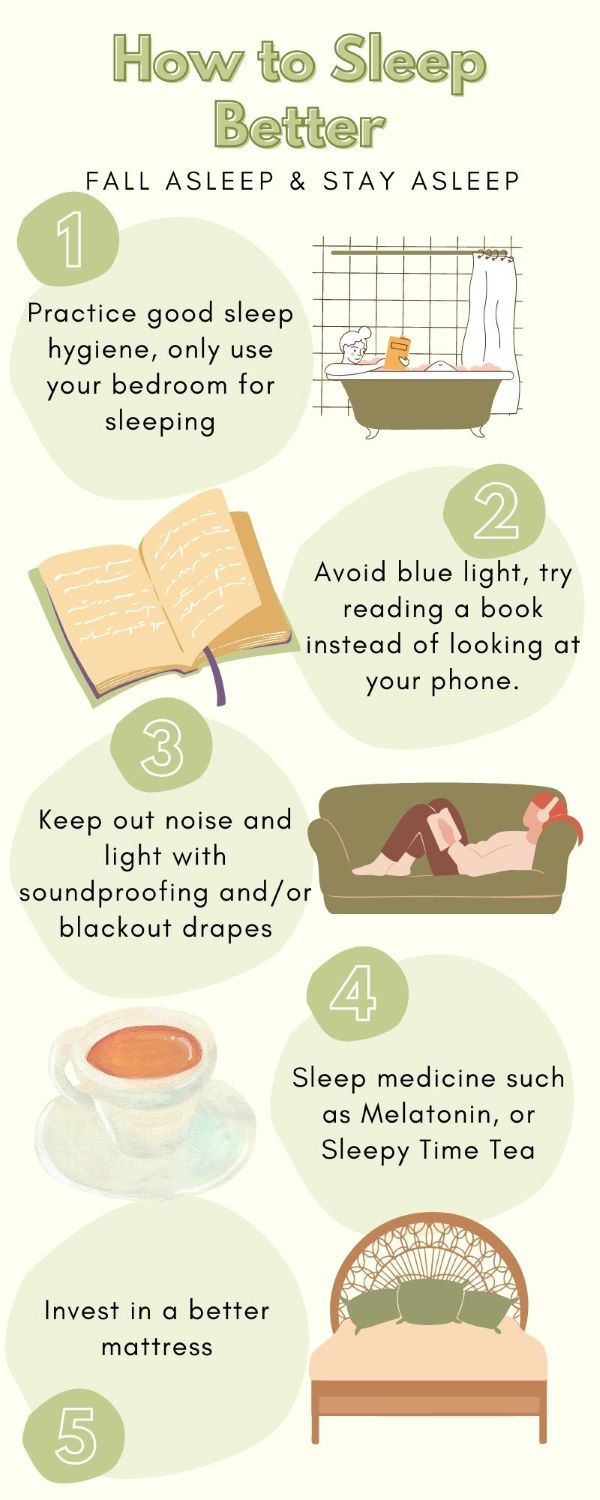No products in the cart.
How to Improve Your Sleep

27
Jan
Getting better sleep isn’t always as easy as it sounds. Considering we spend almost a third of lives doing it, you’d think we’d have pretty good practice. But with a stressful, fast-paced lifestyle, and noisy environments, sometimes sleep can be the most elusive objective. While noise is a significant factor, it’s certainly not the only one. Here is our list of suggestions to help you sleep better!
Steps to Getting Better Sleep
1. Practice good sleep hygiene
Make your bedroom a safe haven. Don’t use it as another office, or library, or even a gym. Don’t lay down in the afternoon to read – find another comfy chair. In the end, you want your body to understand that when you head into the bedroom it’s time to sleep. When you send mixed messages, it’s easy to let your mind wander onto other tasks, necessities, and schedules.
Speaking of schedules, make sure that you keep your schedule regular. Wind down 30-60 minutes before you want to get to sleep; this allows your body to calm, and not jump straight from full speed to snooze. Also, make sure that you’re not taking late naps or enjoying too much afternoon caffeine. These can throw your body off. Finally, try to get to bed around the same time each day. We’ve all experienced jet lag, and the issues that you can encounter when trying to sleep at a drastically different time than before. By keeping your night-time routine consistent, your body will not fight the sleeping process.
2. Avoid blue light
Many of the electronic devices that we use have more blue light in their back-lighting than our body wants or needs. This blue light will disrupt your body’s natural ability to create melatonin, which in effect will disrupt your circadian rhythms (the daily cycle you experience with all of your bodily functions). Reading a book can be more soothing, as well as prevent you from scanning page to page! Try to keep this to a fun read, because getting lost in a non-fiction or self-improvement book can get your engines revving once again.
If you want to stick with your iPad or eReader, or really enjoy that late-night show, try using a pair of blue-blocking glasses. There are also a number of sleep-friendly LEDs out there, that have been proven to support sleep patterns by filtering blue light (they’ve even flown to space, to help astronauts achieve natural rhythms there).
3. Keep the Noise Out
The National Sleep Foundation (NSF) has concluded that sleeping with noise levels at less than 40dB can significantly increase the quality of your sleep. Now that population densities are increasing to previously unthinkable levels, night-time noise can be a constant issue. There are a number of products available to help, whether the noise is coming from upstairs neighbors (structure-borne) or outside traffic (airborne). To reduce sound coming through your windows and doors, where most of the sound comes in, try the AcousticCurtainTM and AcoustiDoorTM. If you can’t find where the sound is entering, read our post on Finding Sound Leaks. Also, check out our article on soundproofing your room from other noises.
See Listing of Soundproofing Curtains
4. Black Out Light Too!
It’s just as important to keep light out as well. Luckily, the brightest source of light (the Sun) is down when most of us are trying to sleep, but night-time lighting in big cities can be an issue, or even just a streetlight outside of your window. There are plenty of blackout curtains on the market, as well as soundproofing curtains (above) that are also blackout-grade. Our bodies have become accustomed to sleeping at night, so even a stray ray of light may damage your ability to get consistently good sleep.
For those that work night shifts, blacking out light is all the more critical!
5. Have a Snoring Partner?
This is a tough issue, since most of the noises we’ve discussed are external to the bedroom. However, when you’ve got someone sleeping there (presumably that you care about), you need to approach the situation delicately.
Ask the person to roll over – this is a short-term solution if they are simply stuffed up, but you don’t want to be doing this on the hour.
You can try to sleep in another room if the problem is persistent, and your living area affords that luxury. Also, talk to the person. Ask them to talk to a professional, or consider using a SnorePin or BreatheRight strips, which may reduce the noise. If the problem is derived from sleep apnea, then a CPAP machine may help them overcome the issue.
You can wear ear plugs, headphones, or use some sort of white noise. This often helps, but may not improve your sleep quality as much as other solutions.
6. Sleep medicine
Many people use sleeping aids that help them achieve a better sleep pattern. There are more natural remedies, such as Melatonin, which can be found at many local food stores, as well as prescription sleeping medicines such as Lunesta or Ambien. Learn more about which medicine is best for you here.
7. Invest in a Better Mattress
Of course, the advice that you often hear is to find a great mattress that fits you just right. This is also the most expensive upgrade you’ll likely make, but don’t hesitate if you think it can help you get to sleep faster, and stay asleep.
Soundproofing for Better Sleep
Ultimately, soundproofing and good sleep hygiene play a critical role in allowing you to fall asleep, and stay asleep. Practice good sleeping habits and you can improve your sleep in as little as 7 days.
Summary

Article Name
How to Improve Your Sleep
Description
Soundproof your bedroom and practice good sleep hygiene to promotoe a healthy sleep cycle. Window and traffic noise are primary culprits of sleep disruption
Author
Walker Peek
Publisher Name
Residential Acoustics
Publisher Logo


